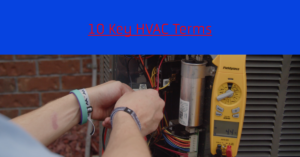HVAC Terminology: 10 Key Terms and What They Mean

As an expert HVAC company, one of our goals is to help homeowners and businesses understand their heating, ventilation, and air conditioning (HVAC) systems better. Whether you’re troubleshooting an issue or simply curious about how things work, understanding common HVAC terminology can help you make informed decisions about your system. Below, we’ll break down key terms like What does SEER mean, freezing air conditioners, central AC and more to help demystify HVAC jargon.
-
What Does SEER Mean in HVAC?
SEER stands for Seasonal Energy Efficiency Ratio. It’s a metric used to measure the energy efficiency of air conditioners and heat pumps. The higher the SEER rating, the more efficient the system is at cooling your space while consuming less energy. SEER is calculated by dividing the total cooling output of an air conditioning system (in British Thermal Units, or BTUs) by the total energy it consumes (in watt-hours) during a typical cooling season.
- What Does a High SEER Rating Mean? A higher SEER rating indicates better energy efficiency. Most modern air conditioners have SEER ratings between 13 and 21, with anything above 16 considered highly efficient. Air conditioners with higher SEER ratings typically cost more upfront but can save you money on energy bills in the long run due to their efficiency. Now that you know what does SEER mean, we can cover some more terms!
-
What Does It Mean When Your Air Conditioner Freezes Up?
If you’ve ever noticed your air conditioner’s evaporator coil covered in ice, that’s a sign that the unit is freezing up. There are several reasons your air conditioner:
- Low Refrigerant Levels: If your AC unit is low on refrigerant due to a leak, it can cause the evaporator coil to freeze because there isn’t enough refrigerant to absorb heat.
- Poor Airflow: Restricted airflow, often caused by a clogged air filter or blocked ducts, can cause the evaporator coil to become too cold and freeze.
- Dirty Coils: When dirt accumulates on the evaporator coils, it reduces heat absorption, leading to freezing.
- Thermostat Issues: If the thermostat is malfunctioning and is set too low, it may cause the AC to run excessively, leading to freezing.
If your air conditioner freezes up, it’s best to turn it off and let the ice melt before calling a professional to inspect the system. Continuing to run the system with frozen coils can cause significant damage.
-
What Does Central AC Mean?
Central air conditioning (Central AC) refers to a system that cools an entire building or home using ductwork. The system consists of an outdoor unit (condenser) and an indoor unit (evaporator coil or air handler). Central AC uses a refrigerant to cool the air inside your home, which is then circulated throughout the house via ducts and vents.
- How It Works: The refrigerant absorbs heat from indoor air, cools it, and then returns it back to the air handler to distribute the cooled air throughout the home. Central AC systems are ideal for large homes or commercial buildings that need consistent, whole-home cooling.
-
What Does “Dry” Mean in an Air Conditioner?
When people refer to an air conditioner as “dry,” they are usually referring to the system’s ability to dehumidify the air. One of the key functions of an air conditioner, aside from cooling, is to remove humidity from the air. As air flows over the cold evaporator coils, moisture from the air condenses and is collected in a drain pan or expelled via a drain line.
- Why Is This Important? Dehumidified air feels cooler and more comfortable. In humid environments, an air conditioner’s “dry” function helps lower the humidity level, making your home feel more comfortable even if the temperature is slightly higher. Some systems also have a “dry mode” that prioritizes dehumidification over cooling.
-
What Does E5 Mean on an Air Conditioner?
If you see an “E5” error code on your air conditioner’s display, it typically indicates a specific issue with the unit. The exact meaning can vary depending on the manufacturer, but generally, it refers to a fault in the system that requires attention. Common issues related to the E5 error include:
- Faulty Thermistor: A thermistor is a temperature sensor that helps regulate your system’s operation. If it’s malfunctioning, it can trigger an E5 error.
- Communication Error: In some cases, the E5 code may appear due to communication errors between the components, particularly in more complex, modern systems.
- Outdoor Unit Issues: An E5 error may also suggest problems with the outdoor unit or its electrical connections.
If you encounter this error, it’s important to consult your air conditioner’s user manual or call an HVAC technician for diagnosis and repair.
-
What Does Forced Air Mean?
Forced air refers to a type of heating and cooling system that uses a blower or fan to push heated or cooled air through ducts and into rooms. Forced air systems can be powered by electricity, natural gas or other fuels, and are common in homes with central heating and cooling.
- How It Works: In a forced air heating system, air is heated by a furnace and then circulated through the home. In a cooling system, the air is cooled by the air conditioner and distributed in the same way. The term “forced air” is used because the air is physically pushed through the ducts by a fan or blower, rather than relying on natural convection.
Forced air systems are very common due to their efficiency and ability to distribute heat or cool air quickly across large areas.
-
What Does “Hold” Mean on an Air Conditioner?
The “Hold” function on an air conditioner, typically found on programmable thermostats, allows you to maintain a constant temperature setting without the system adjusting according to your programmed schedule. It “holds” the current temperature setting until you manually change it or disable the “Hold” function.
- When to Use It: This feature is useful when you want to maintain a specific temperature for a period, such as when you’re home for an extended time or during special occasions. For example, if you want the system to keep your home cooler or warmer than usual, you can activate the “Hold” function rather than letting the system revert to its usual programmed settings.
-
What Does It Mean When Your AC Is Leaking Water?
If your air conditioner is leaking water, it’s a sign that something is wrong with the system. The two most common causes of water leakage in air conditioners are:
- Clogged Drain Line: Air conditioners have a drainage system that removes the moisture collected by the evaporator coils. If the drain line becomes clogged with dirt or algae, the water can back up and leak from the system.
- Frozen Coils: If the evaporator coils freeze due to low refrigerant, poor airflow or dirty filters, they can cause excess moisture to accumulate, leading to leaks once the coils thaw.
Water leakage from the AC should be addressed quickly, as it can damage the surrounding area and cause mold or mildew growth. A professional HVAC technician can diagnose and repair the problem.
-
What Does RTU Stand for in HVAC?
RTU stands for Rooftop Unit. An RTU is a self-contained heating and cooling system mounted on the roof of a commercial building or large home. These units are often used in commercial settings, such as shopping malls, office buildings or restaurants, because they save space and can provide both heating and cooling for the entire building.
- How It Works: RTUs typically feature a heat exchanger, blower and compressor, all in one unit. They provide conditioned air to the building’s interior through ductwork connected to the unit. RTUs are often used for buildings that have no room for a traditional indoor HVAC system.
-
What Does Tonnage Mean in HVAC?
Tonnage in HVAC refers to the cooling capacity of an air conditioning system. One ton of cooling capacity is equivalent to the ability to cool 12,000 BTUs (British Thermal Units) per hour. The higher the tonnage, the greater the cooling capacity of the system.
- What Does It Mean for Your Home? The appropriate tonnage for your air conditioner depends on several factors, including the size of your home, insulation and climate. An underpowered system (too small a tonnage) will struggle to cool your space, while an overpowered system (too large a tonnage) will cycle on and off too often, leading to inefficiency.
Conclusion
Understanding HVAC terminology is essential for managing your heating and cooling systems effectively. Terms like what does SEER mean, E5 error codes, forced air and tonnage are integral to the performance and efficiency of your system. Whether you’re troubleshooting an issue, upgrading your system or simply trying to understand how your HVAC works, having a grasp of these common terms will help you make informed decisions. As always, if you’re unsure or encounter any problems, it’s best to consult with a licensed HVAC professional to ensure your system is functioning properly. If you are in Jacksonville, Florida and are looking for HVAC professionals call us or visit our website to learn more!


